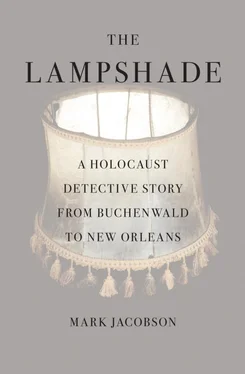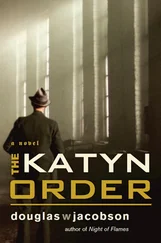So, with respect and as gently as I could, I placed the lampshade into its new, stark-white home with its bloodred handle. The customs people and the cops might order me to peel back the Velcro that held the box’s lid closed. They might demand to look inside. If so, what would they see? An old, torn lampshade. They were looking for bombs, C-4, pistols, box cutters, not souls.
A few days after landing in the Holy City, I was sipping a cup of tea at the Three Arches Restaurant inside the Jerusalem YMCA on King David Street, engaged in a conversation with Yehuda Bauer regarding particularism and universalism as it pertained to the lampshade found in New Orleans. Attired in a jaunty royal blue windbreaker with racing stripes down the arms and describing himself as “quite lively for a semiretired eighty-three-year-old with a foot and a half in the grave,” Bauer listened patiently as I made my case about how the Bode lab’s DNA test, which identified the shade as being of human origin but did not specify the kind of human, might place the object in “a no-man’s-land of murder,” belonging to no one and no group. “To me that makes it a potentially universalist object,” I said to the famous scholar.
Bauer’s own position on the issues of universalism and particularism are well known among Holocaust scholars. Speaking in front of the German Bundestag in 1998, he had asked, “How is it possible to compare the tragedy of a Jew, or a Russian peasant, or a Tutsi, or a Cambodian Khmer? It is, surely, impossible to say one mass murder is better or worse than another, that the suffering of one person is greater or less than that of another. Such a statement would be repulsive.”
Yet in the Holocaust, Bauer continued, “for the first time in the whole of history, people descended from a particular kind of grandparent—in this case Jewish—were condemned to death just for being born. This, the mere fact of their having been born, was by itself their deadly crime that had to be avenged by execution. This has never happened before, anywhere.”
At the Jerusalem YMCA, Bauer received my lampshade claims with the patience of a bemused elder, as if they were part of an overblown but not uninteresting grad student paper. He was willing to entertain the possibility that the lampshade might qualify as “an icon of genocide.” Likewise, the “tantalizingly inconclusive” DNA report was “intellectually provocative.” But as for what any of these notions proved, if anything, Bauer would not venture a guess.
Not that he had any doubt that the lampshade was real, Bauer said. When I took the shade out of its white box, he hesitated before approaching it. “A sobering sight,” he said. But if the science of the shade was a matter for the lab workers, what it meant—the position it might take in the Holocaust narrative or the wider discussion of human affairs—was a trickier business. “I think you should not worry too much about arguments about things like universalism and particularism. These discussions are for academics, people like me,” Bauer said, dipping a piece of pita bread into a plate of hummus.
“You are a writer, you tell stories. The meaning comes from the telling, and the retelling.” Not to make any comparisons, Bauer said, but this is what he often thought when he encountered Holocaust survivors: “Tell your story. Don’t stop telling it.” For Bauer, oral history was mutually beneficial to the teller and the listener. In the past decades, he’d heard so many stories. “Thousands of terrible stories, rattling around in my brain.” Some of these narratives were more revealing than others, but all of them, even the lies, had value. One day, however, the last survivor will die. Then, even though he and many other historians had written down the stories, finding the truth of things will become more difficult because the voices, “the sound of them, the voice of the teller, will never be heard again.”
This was why he liked hearing about the lampshade from New Orleans, Bauer said, and why I should keep telling the story. “This Dominici, for instance, he is quite a fellow,” he remarked, leaning back in his chair. Bauer couldn’t hear enough about the former cemetery bandit. “The role of the thief is always interesting, the ambiguities of so-called good and evil in situations of extremis,” he said, captivated by the account of how Dominici had talked himself into the psych ward at the OPP by insisting on immunity from prosecution owing to his status as the locator of “the Nazi lampshade.”
“What a character!” the scholar exclaimed.
On the Dominici front, there had been some recent news. Since I visited him at the OPP, he’d been convicted on a number of charges and sent to the state pen in DeQuincy, in the swamplands near the Texas border. In a letter I received from him, Dominici maintained a steadfastly upbeat account of his life and times, reporting he was keeping his “nose clean and mouth shut,” promising to be “back-at-ya” in no time. DeQuincy was no picnic, but being locked up was “a blessing in disguise” since it gave him plenty of time to work on his autobiography, which he planned to call Or Else Is Here — Drugs, Money, Graveyard Robbery! A Drug Addict’s Insane Ideas to Keep from Being DopeSick!
“ Or Else Is Here ?” Bauer repeated, trying to grasp the gist of Dominici’s title. Then, looking up with a wide grin, Bauer, who purports to be “a world-class collector of Jewish jokes good, bad, and indifferent,” said, “Oh. Now I get it. Or Else Is Here. You either do this, or else. You didn’t do it, so now Or Else Is Here ! A marvelous concept, I think. A very Jewish concept. ” In a way, he said, Dominici’s title also described the history of the State of Israel. “Or else is always here.”
When I met Bauer at the Y, the Israeli invasion of Hamas-ruled Gaza was still weeks away but clearly in the wind. Hamas had been firing rockets into Israeli territory with increasing frequency. Reaction by the IDF was inevitable. “The Army will go in there because it will be seen as necessary and they will do it with great popular support,” Bauer said. Despite his long involvement with the now marginalized left-wing Israeli “peace” parties like Mapam and Meretz, Bauer could see no other way of looking at the realpolitik of the situation. He had no doubt about what he called the “genocidal mind-set toward the Jewish people” on the part of Hamas and other radical Islamic groups. “What do you say to people who claim to prefer you were dead?” he asked. This threat worked both ways, added Bauer. In 2003 he had caused something of a stir when he said that in the armed conflict between the Israelis and Palestinians, “if one side becomes stronger, there is a chance of genocide.” Asked by shocked observers if he was really suggesting that the State of Israel might be capable of committing genocide against the Palestinians, Bauer, professor of the Holocaust, said, “Yes.”
Five years later, the Israeli situation was no better. Relations with the Palestinians had reached a numbing antipathy on both sides; the rise of Muslim fundamentalism with its eliminationist rhetoric had only grown louder and more dangerous. Ahmadinejad was hosting meetings in Tehran to deny the Holocaust. Throughout western Europe, hostility toward Israel, especially on the left, was often translated to mean anti-Semitism in many quarters. Inside Israel itself, the liberal, secular society envisioned by many of the yishuv, the early Zionist settlers, kibbutzim idealists who’d fought to establish a nation, was under siege. Many intellectuals had left the country. To live in Jerusalem now was “to be squeezed by various fundamentalists on all sides,” Bauer said, including the ever-growing community of the ultra-Orthodox, or Haredi, members of the various Hasidic sects, each with their own rebbes, who would throw stones at your car if they saw you driving on the Sabbath.
Читать дальше












